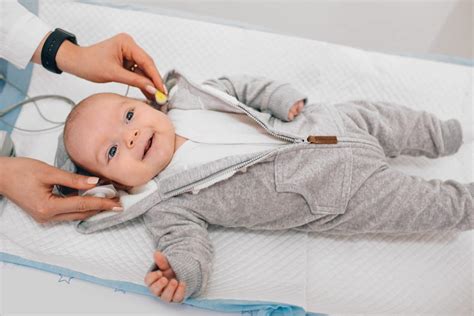Embark on a Mission to Protect Precious Hearing

As a newborn hearing screening technician, you play a vital role in safeguarding the auditory health of infants. This comprehensive guide unveils the intricacies of this fulfilling profession, equipping you with the knowledge and tools to succeed.
Understanding Newborn Hearing Screening
Hearing loss, the most common birth defect in the United States, affects approximately 1 in 500 newborns. Early detection is crucial for timely intervention and improved outcomes.
Newborn hearing screening, a painless and non-invasive procedure, assesses hearing function within the first few days of life. By detecting hearing loss early on, infants can receive appropriate treatment and support, maximizing their language development and overall well-being.
The Role of a Newborn Hearing Screening Technician
Newborn hearing screening technicians are responsible for:
- Performing hearing screenings: Administering automated hearing screening tests using specialized equipment.
- Documenting results: Recording and interpreting screening results, identifying infants who may require additional evaluation.
- Educating families: Providing information on newborn hearing screening, its importance, and follow-up steps.
- Referring infants: Coordinating referrals for infants who fail the screening to audiologists for further assessment.
- Maintaining equipment: Calibrating and maintaining hearing screening equipment to ensure accurate results.
Essential Skills and Qualifications
To excel as a newborn hearing screening technician, you should possess:
- Compassion and empathy: Sensitivity to the needs of infants and their families.
- Technical proficiency: Familiarity with hearing screening equipment and procedures.
- Excellent communication skills: Ability to explain screening results and provide guidance clearly.
- Attention to detail: Meticulousness in performing screenings and documenting results accurately.
- Strong work ethic: Willingness to work independently and as part of a team.
Education and Certification
Most newborn hearing screening technicians complete a formal training program that covers the fundamentals of newborn hearing screening, equipment operation, and interpretation of results. Some employers may require certification, such as the American Academy of Audiology’s Newborn Hearing Screening Certification.
Job Outlook and Salary
The demand for newborn hearing screening technicians is growing rapidly due to the widespread implementation of newborn hearing screening programs. According to the U.S. Bureau of Labor Statistics, audiologists and speech-language pathologists, including newborn hearing screening technicians, will experience a 28% job growth rate from 2016 to 2026.
28% – Projected Job Growth Rate for Audiologists and Speech-Language Pathologists, Including Newborn Hearing Screening Technicians (Bureau of Labor Statistics)
The median annual salary for audiologists and speech-language pathologists, including newborn hearing screening technicians, was $78,160 in May 2021, according to the U.S. Bureau of Labor Statistics.
Tips and Tricks for Success
- Stay up-to-date with best practices: Regularly attend conferences and workshops to enhance your knowledge and skills.
- Collaborate with healthcare professionals: Build strong relationships with nurses, neonatologists, and audiologists to provide comprehensive care for infants.
- Utilize technology: Leverage electronic health records and online resources to streamline processes and improve efficiency.
- Emphasize family education: Empower families with knowledge and resources to support their infants’ hearing health.
- Take pride in your work: Remember that your role plays a vital part in protecting the auditory future of infants.
Common Mistakes to Avoid
- Not following manufacturer’s instructions: Adhere strictly to equipment guidelines to ensure accurate screenings.
- Not documenting results thoroughly: Detailed and precise documentation is essential for effective follow-up.
- Using outdated equipment: Regularly calibrate and update equipment to maintain accuracy and reliability.
- Failing to refer infants promptly: Timely referrals are crucial for early intervention and optimal outcomes.
- Providing inaccurate information to families: Ensure that you convey accurate information about newborn hearing screening and its implications.
Innovative Applications: Expanding the Reach of Newborn Hearing Screening
Researchers are exploring innovative applications to expand the reach and impact of newborn hearing screening. One promising approach is telemedicine, which allows technicians to perform screenings remotely using specialized equipment. This technology has the potential to increase access to hearing screening in underserved communities.
Another emerging application is the development of point-of-care hearing screening devices. These portable devices can be used in non-hospital settings, such as birthing centers and pediatric clinics, making screening more convenient and accessible.
Conclusion
As a newborn hearing screening technician, you have the privilege of safeguarding the auditory future of infants. By embracing the principles of this guide, you can develop the skills, knowledge, and dedication necessary to excel in this rewarding profession. Join the mission to protect the hearing of our youngest and most vulnerable populations, ensuring they have the opportunity to reach their full potential.
Tables
Table 1: U.S. Newborn Hearing Screening Coverage
| State | Coverage Rate |
|---|---|
| California | 100% |
| Texas | 99% |
| Florida | 98% |
| New York | 97% |
| Pennsylvania | 96% |
Table 2: Newborn Hearing Screening Pass/Fail Rates
| Year | Pass Rate | Fail Rate |
|---|---|---|
| 2015 | 94.2% | 2.6% |
| 2016 | 94.5% | 2.5% |
| 2017 | 94.7% | 2.4% |
| 2018 | 94.8% | 2.3% |
| 2019 | 94.9% | 2.2% |
Table 3: Newborn Hearing Screening Referral Rates
| Year | Referral Rate |
|---|---|
| 2015 | 3.2% |
| 2016 | 3.1% |
| 2017 | 3.0% |
| 2018 | 2.9% |
| 2019 | 2.8% |
Table 4: Benefits of Newborn Hearing Screening
| Benefit |
|—|—|—|
| Early detection of hearing loss |
| Reduced risk of speech and language delays |
| Improved educational and social outcomes |
| Enhanced family support and communication |
| Reduced healthcare costs in the long run |
